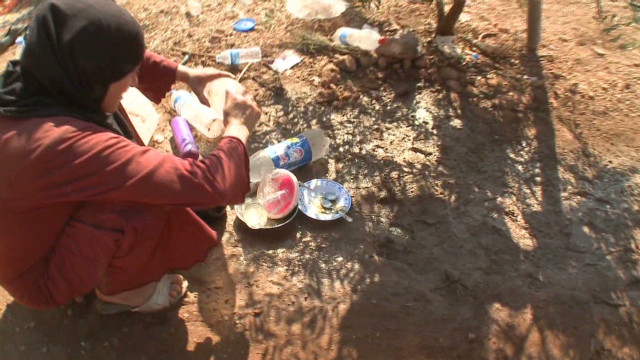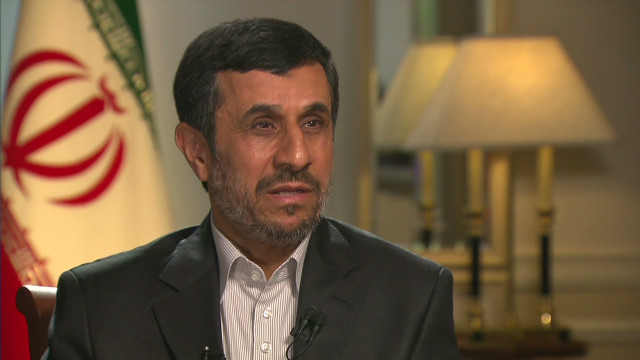On the diplomatic front, Iranian Foreign Minister Ali Akbar Salehi, whose country is Assad’s main Middle East ally, arrived in Damascus to consult with the Syrian leader about proposals by regional powers to resolve the 17-month Syrian crisis.
Iran confirms military presence in Syria
|
Members of Iran’s elite Islamic Revolutionary Guards Corps (IRGC) are in Syria providing non-military assistance, IRGC commander-in-chief Mohammad Ali Jafari said during a press conference on Sunday, adding that his forces were prepared to take action in the event Syria was attacked.
The statement is the first official acknowledgement from a senior military official that Iran has a military presence on the ground in Syria where an uprising has left tens of thousands dead since it began 18 months ago.
Western countries and Syrian opposition groups have accused Iran of providing weapons and expertise to Syrian armed forces and have suspected an Iranian military presence inside the country. Iran has denied this.
The Islamic Republic has backed President Bashar al-Assad since the crisis began and regards his rule as a key part of its axis of resistance against Israel and Sunni Arab states.
(FRANCE 24 with wires)
|
|
Salehi’s talks followed a meeting in Cairo on Monday of the “Contact Group”, grouping Iran, Egypt, Turkey and Saudi Arabia. Salehi said before leaving Cairo that the four states had a “great role” to play and could table a proposal that might produce a satisfactory result but that it needed more talks.
In the Syrian capital Damascus, rebels said they had started to retreat from southern districts early on Wednesday after weeks of heavy bombardment and government air strikes.
The neighbourhoods of Hajar al-Aswad, al-Asali and al-Qadam lie on the southern edge of what is considered Damascus proper and a withdrawal will be seen as a large setback after rebel gains in the capital three months ago.
The revolt, which began as peaceful street protests cracked down on by Assad’s military, has escalated into a civil war in which more than 27,000 people have died. Daily death tolls now approach 200 and the last month was the bloodiest yet.
London-based Amnesty International said in a report on Wednesday that civilians, including many children, are the main victims of indiscriminate Syrian army bombing and shelling of areas abandoned to opposition forces.
The international human rights group said attacks near hospitals and on bread queues appeared to be deliberately targeted at civilians, and thus constituted war crimes
Government forces use “battlefield weapons which cannot be aimed at specific targets, knowing that the victims of such indiscriminate attacks are almost always civilians,” said Amnesty’s Senior Crisis Response Adviser Donatella Rovera.
Chemical weapons plans
A former Syrian general was quoted on Wednesday as saying that his country had drawn up plans to turn chemical weapons against rebels and civilians in Aleppo. He said he was involved in top-level talks before defecting to Turkey three months ago.
“We were in a serious discussion about the use of chemical weapons, including how we would use them and in what areas,” Major-General Adnan Sillu told The Times newspaper.
“We discussed this as a last resort - such as if the regime lost control of an important area such as Aleppo.”
Sillu said Syria, which began to acquire the ability to develop and produce chemical weapons agents in 1973, also considered transferring chemical weapons to the Lebanon-based Shi’ite Muslim Hezbollah group - a move that could prompt Israel into action.
Activists said 170 people, mostly civilians, were killed on Tuesday.
At the Tel Abyad border crossing, one of seven main crossing points on the Turkish-Syrian border, television footage showed rebels tearing down a Syrian flag above one government building.
“I can confirm that the (Tel Abyad) gate has fallen. It is under the complete control of the rebels,” a Turkish official said.
The fighting, which started on Tuesday evening, appeared to be the first attempt by insurgents to assert their grip over a border zone in Syria’s al-Raqqa province, most of which has remained solidly pro-Assad.
Rebels hold two other crossings on the northern border with Turkey. A third border point would help strengthen their control in the north and put more pressure on the army as they battle for control of Syria’s largest city Aleppo not far away.
‘Fighters will be back’
In Damascus, a rebel fighter told Reuters that civilians had been fleeing the southern suburbs for days and now rebels were withdrawing as they were unable to resist the heavy bombardment.
“They’re withdrawing to another area because we just don’t have enough weapons to keep up our hit and run operations. Also, we’ve got a lot of wounded people and many martyrs. The wounded need treatment and the fighters need some rest,” said Moaz, a rebel in Damascus, who was wounded last week.
“The regime is bent on destroying all of the southern region to try to keep us from advancing. But the southern areas are quite large, so the regime will move into one area and comb it for rebels, while we move to another. There are a lot of places we can go, and the fighters will be back to fight again soon.”
Syrian state television said the armed forces had freed four employees from an electricity terminal building in Hajar al-Aswad after the men were kidnapped by “terrorists,” a broad brush term they use to refer to the opposition.
On Wednesday, activists uploaded a video of 11 dead bodies laid on the floor of a mosque in the Damascus suburb of Jobar.
The bloodied corpses were laid out on white stretchers and appeared to have been shot dead. Some of the men checking the bodies were sobbing. Activists had scribbled the names of some of the dead on white paper and the unknown were marked with a number. Activists said several of the bodies were men who had been arrested by Assad’s forces and executed.
Refugees flee fighting The civil war in Syria is spilling over its borders, with related sectarian violence in Lebanon and hundreds of thousands of refugees living in neighbouring countries.
One Turkish woman and her daughter were wounded on Tuesday night by stray bullets from the fight for the border gate and an official said other bullets had smashed windows in several houses along the border.
Salehi said his mission was to “consult with (Syrian) officials to reach a unified conclusion on a solution to the Syrian crisis.” But the international community has failed to halt the violence.
Western and Arab countries have all demanded that Assad step down. Iran has stood staunchly by Assad, agreeing that the revolt is a foreign-backed conspiracy and accusing Saudi Arabia and Turkey of helping the rebels who are fighting to topple him.
Russia and China, both veto-wielding U.N. Security Council members, have blocked three resolutions condemning Assad.
On Wednesday, Syrian National Council (SNC) head Abdulbaset Sieda told pan-Arab al-Hayat newspaper that Iran was “part of the problem” and should not be involved in efforts to resolve the Syrian crisis.
He called on Arab states to work together to effect an international intervention in Syria similar to the campaign in Libya, which helped to topple Libya’s Muammar Gaddafi.
Although the West has shied away from intervention in Syria, France’s ambassador to Syria told France Inter radio on Wednesday that he had been instructed by President Francois Hollande to help organise the opposition, including armed groups, and that Paris was “seriously” discussing the issue of arming the rebels.
“We are working with the opposition to help them organise themselves and I have been instructed by the president to talk to all the components of the opposition, including, and we are the first country to do it in such a structured way, armed groups,” Eric Chevallier said.
French Foreign Minister Laurent Fabius has repeatedly said Paris, which is providing non-lethal aid to rebels including communications equipment and night vision goggles, would not give weapons given the embargo and for fears the weapons could get into the wrong hands.


































